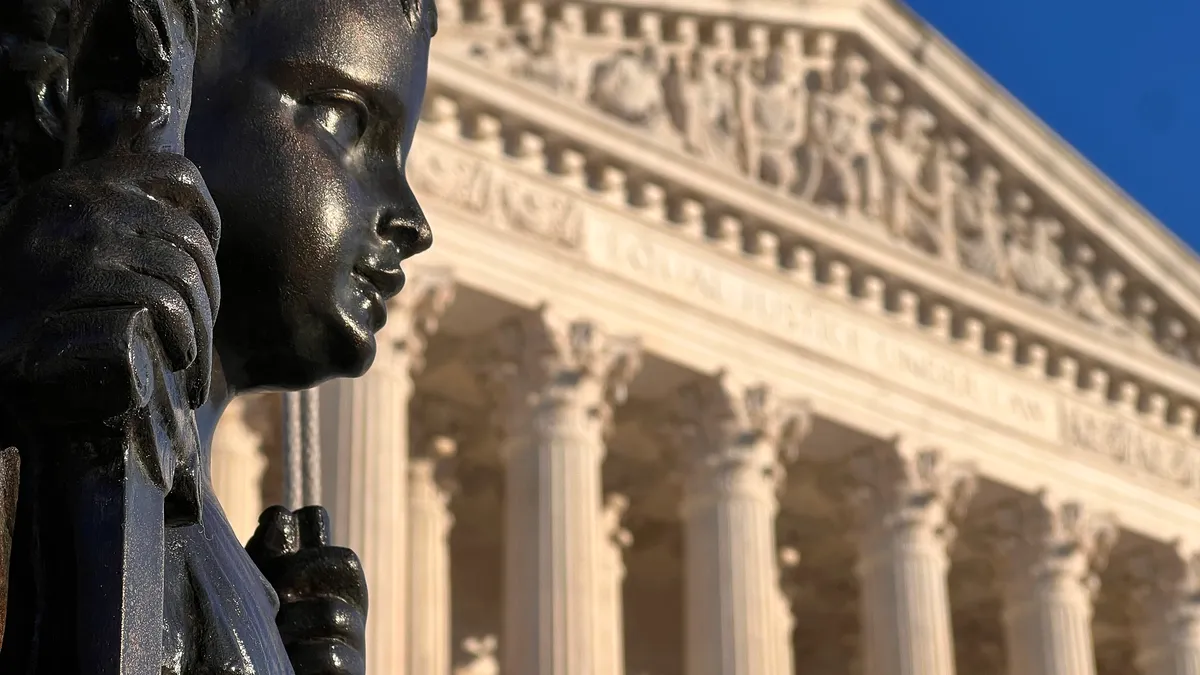Dive Brief:
- The U.S. Supreme Court denied some businesses’ hopes for tax relief with its decision Thursday in the Moore v. United States case, in which it upheld the constitutionality of the one-time Mandatory Repatriation Tax on accumulated and undistributed earnings from investments in foreign corporations that was part of the Tax Cuts and Jobs Act.
- “In 2017, Congress enacted a new law that attributes more income, including active business income, of American controlled foreign corporations to their American shareholders and then taxes those shareholders on that income,” Associate Justice Brett Kavanaugh wrote in the majority opinion for the court. “The question is whether that 2017 tax (known as the Mandatory Repatriation Tax or MRT) is constitutional under Article I, §§8 and 9 and the Sixteenth Amendment. This Court’s longstanding precedents establish that the answer is yes.”
- The ruling effectively renders moot any refund claims filed on the basis of an argument asserting the unconstitutionality of the tax, according to Joshua Odintz, a partner at the law firm of Holland & Knight. Odintz was on a team of attorneys who penned an amicus brief in support of the government led by George A. Callas, a federal tax policy expert who previously worked as senior tax counsel to former Speaker of the House of Representatives Paul Ryan.
Dive Insight:
While seven justices agreed on the constitutionality matter, the court was split on what analysis should be undertaken in assessing whether a future tax provision is constitutional, Odintz said. Associate Justice Clarence Thomas filed a dissenting opinion joined by fellow Associate Justice Neil Gorsuch, with Associate Justice Amy Coney Barrett filing a concurring opinion.
“It’s a very narrow decision that leaves open the potential for future challenges,” Odintz said. “That’s the real issue for businesses: that there could be other challenges to the [tax] code that could impact them.”
The opinion describes the MRT as a new and one-time pass-through tax on some American shareholders and American-controlled foreign corporations, noting that it sought to address a loophole in the current system under which “American-controlled foreign corporations had earned and accumulated trillions of dollars in income abroad that went almost entirely untaxed by the United States.”
The suit was originally filed by Charles and Kathleen Moore who invested $40,000 in a U.S. controlled foreign corporation in India and obtained a 13% ownership. From 2006 to 2017, the Moores’ share of the corporation’s accumulated income was $508,000 and after a deduction, they declared $132,512 in income. They owed and paid $14,729 on the income and then sued for a refund, claiming that MRT was unconstitutional because it violated the Direct Tax Clause of the Constitution, and asserted it violated the Fifth Amendment because it applied retroactively to past income.
The Moores were not alone in their opposition to the tax. The U.S. Chamber of Commerce, in an amicus filing in Supreme Court case, argued that gains need to be realized in order to meet the income threshold.
“Like the purchaser of a plant still owned, the contributor to a retirement account still awaiting retirement, or the collector of baseball cards still under a childhood bed, the Moores have not seen or realized a dime since making their initial investment,” the Chamber of Commerce argued in its filing. “Income has a plain and longstanding meaning: for something to be ‘in-come,’ it must, in some way, ‘come in.’’’
In 2020, the IRS said it would consider requests seeking relief from double taxation under the new repatriation rules, CFO Dive previously reported.












